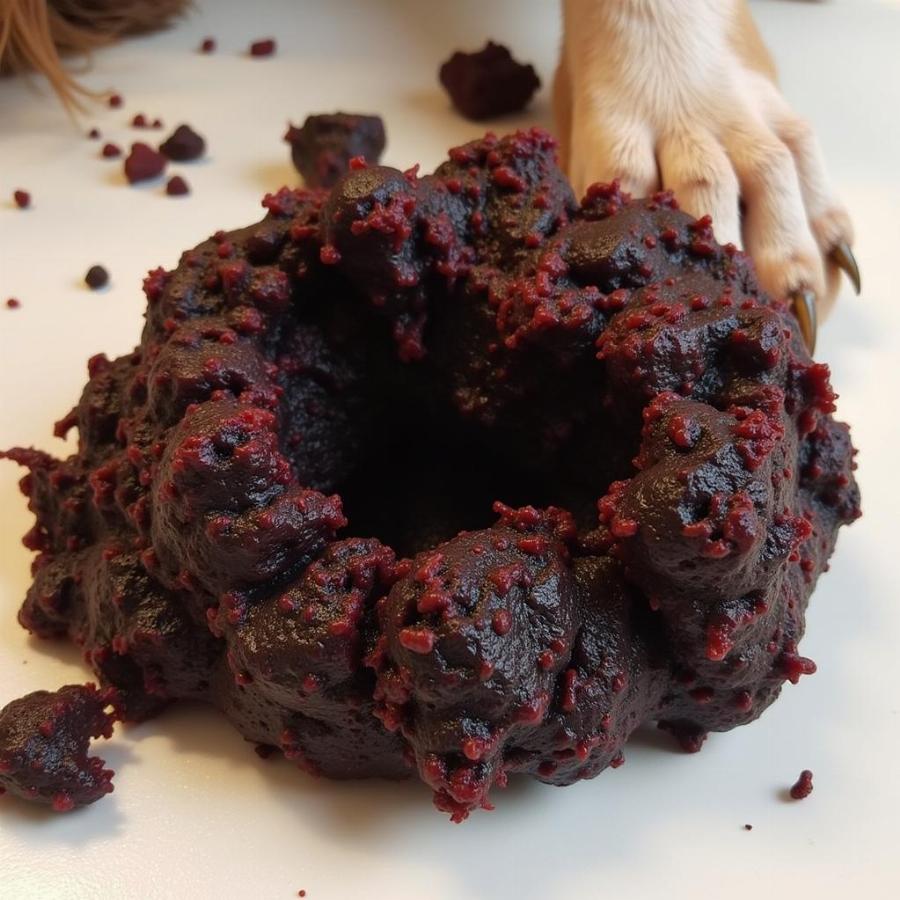Black dog poop can be alarming, and rightfully so. While not always a sign of a serious issue, it warrants investigation. This article will explore the possible causes of black stool in dogs, helping you understand when it’s time to worry and when it’s likely something less serious. We’ll cover everything from diet to more serious medical conditions so you can be prepared to discuss your dog’s health with your veterinarian.
Understanding the Causes of Black Dog Poop
Several factors can contribute to black stools in dogs. Some are relatively harmless, while others indicate a potentially life-threatening condition. Recognizing the difference is crucial for ensuring your furry friend receives the appropriate care.
Diet-Related Causes of Black Stool
Sometimes, a simple dietary change can explain the dark coloration. Certain foods, particularly those high in iron or containing dark pigments, can temporarily darken stool. For example, dog food with blood meal, or treats like liver, can cause darker stools. Supplements containing iron can also have this effect. If you’ve recently introduced a new food or supplement, monitor your dog’s stool for a few days to see if it returns to normal.
Medications and Black Dog Poop
Certain medications, such as Pepto-Bismol (bismuth subsalicylate), can also turn your dog’s poop black. This is a normal side effect and usually isn’t cause for concern. However, always consult your veterinarian if you’re unsure about any medication your dog is taking.
Bleeding in the Upper Digestive Tract
One of the more serious reasons for black, tarry stool (melena) is bleeding in the upper digestive tract, including the stomach or small intestine. The black color comes from digested blood. This type of bleeding can be caused by ulcers, tumors, or the ingestion of foreign objects. If you notice black, tarry stools accompanied by other symptoms like vomiting, lethargy, or loss of appetite, seek immediate veterinary attention.
 Black Tarry Dog Poop (Melena)
Black Tarry Dog Poop (Melena)
Bleeding in the Lower Digestive Tract
While bleeding in the lower digestive tract, such as the colon or rectum, typically results in bright red blood in the stool (hematochezia), it can occasionally cause darker stools. This is less common than melena and often indicates an issue closer to the exit point, like colitis or anal gland problems.
When to See a Veterinarian
Black stool, especially if it’s tarry, warrants a veterinary visit. Even if your dog seems otherwise healthy, it’s crucial to rule out any underlying medical conditions. Provide your vet with a detailed history of your dog’s diet, medications, and any other observed symptoms. This information will help them determine the cause of the black stool and recommend the appropriate treatment.
What to Expect at the Vet
Your veterinarian may perform several tests, including a fecal exam, blood work, and possibly X-rays or ultrasound, to diagnose the cause of the black stool. Depending on the suspected cause, they may also recommend an endoscopy to visualize the upper digestive tract.
Preventing Black Stool in Dogs
While not all causes of black stool are preventable, you can take steps to minimize the risk. Feed a high-quality, balanced diet, avoid giving your dog table scraps or bones, and ensure they don’t have access to potentially harmful objects. Regular veterinary checkups are also essential for early detection of any potential problems.
Is Black Dog Poop Ever Normal?
Black stool is rarely normal. While certain foods and medications can cause temporary darkening, it’s essential to investigate any instance of black, especially tarry, stool to ensure there isn’t a more serious underlying issue.
What Does it Mean When a Dog Poops Black Liquid?
Black, liquid stool could indicate a severe case of diarrhea combined with one of the causes mentioned earlier, like bleeding in the digestive tract. It requires immediate veterinary attention.
Conclusion
Black dog poop can be a sign of a minor dietary issue or a more severe medical problem. Don’t ignore this symptom. Prompt veterinary attention is key to ensuring your dog receives the necessary care and treatment. By being observant and proactive, you can help keep your canine companion happy and healthy.
FAQ
- Can stress cause black dog poop? While stress can affect digestion, it doesn’t directly cause black stool. However, it can exacerbate existing conditions that might lead to black stool.
- Should I be worried if my dog’s poop is dark brown but not quite black? Dark brown stool is usually normal. However, monitor for any changes in consistency or frequency and consult your vet if you’re concerned.
- How can I tell if my dog’s black stool is due to digested blood? Black, tarry stool (melena) is often indicative of digested blood. It has a distinct, foul odor.
- What should I do if my dog has black poop and is vomiting? This combination of symptoms can indicate a serious problem. Seek immediate veterinary care.
- Can puppies have black poop? Yes, puppies can have black poop for the same reasons as adult dogs. It’s crucial to consult a vet if you notice this symptom in a puppy.
- Are certain dog breeds more prone to black stool? No, any breed can experience black stool. The causes are generally related to diet, medication, or underlying health conditions, not breed.
- Can changing dog food too quickly cause black poop? While a sudden diet change can cause digestive upset, including diarrhea, it’s unlikely to directly cause black stool.
You may find these other articles on our site helpful: bloody dog poop, dog poops blood
Beaut Dogs is your trusted source for comprehensive and reliable information on all aspects of dog care. From breed selection to health concerns, we offer expert advice to help you navigate the joys and challenges of dog ownership. If you need personalized support, email us at [email protected] (Email address) for detailed and accurate answers from Beaut Dogs.